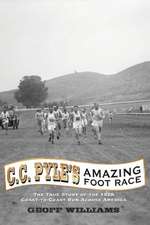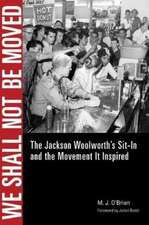American Evangelicals and the 1960s: Studies in American Thought and Culture
Editat de Axel R. Schäferen Limba Engleză Paperback – 22 aug 2013
In the late 1970s, the New Christian Right emerged as a formidable political force, boldly announcing itself as a unified movement representing the views of a "moral majority." But that movement did not spring fully formed from its predecessors. American Evangelicals and the 1960s refutes the thesis that evangelical politics were a purely inflammatory backlash against the cultural and political upheaval of the decade.
Bringing together fresh research and innovative interpretations, this book demonstrates that evangelicals actually participated in broader American developments during "the long 1960s," that the evangelical constituency was more diverse than often noted, and that the notion of right-wing evangelical politics as a backlash was a later creation serving the interests of both Republican-conservative alliances and their critics. Evangelicalism's involvement with—rather than its reaction against—the main social movements, public policy initiatives, and cultural transformations of the 1960s proved significant in its 1970s political ascendance. Twelve essays that range thematically from the oil industry to prison ministry and from American counterculture to the Second Vatican Council depict modern evangelicalism both as a religious movement with its own internal dynamics and as one fully integrated into general American history.
Din seria Studies in American Thought and Culture
-
 Preț: 212.38 lei
Preț: 212.38 lei -
 Preț: 172.18 lei
Preț: 172.18 lei -
 Preț: 155.96 lei
Preț: 155.96 lei -
 Preț: 145.83 lei
Preț: 145.83 lei -
 Preț: 244.08 lei
Preț: 244.08 lei -
 Preț: 279.67 lei
Preț: 279.67 lei -
 Preț: 191.22 lei
Preț: 191.22 lei -
 Preț: 222.55 lei
Preț: 222.55 lei - 11%
 Preț: 206.75 lei
Preț: 206.75 lei -
 Preț: 182.69 lei
Preț: 182.69 lei -
 Preț: 257.78 lei
Preț: 257.78 lei -
 Preț: 231.97 lei
Preț: 231.97 lei -
 Preț: 309.44 lei
Preț: 309.44 lei -
 Preț: 233.89 lei
Preț: 233.89 lei -
 Preț: 196.94 lei
Preț: 196.94 lei - 11%
 Preț: 230.50 lei
Preț: 230.50 lei - 11%
 Preț: 229.11 lei
Preț: 229.11 lei - 12%
 Preț: 267.58 lei
Preț: 267.58 lei
Preț: 258.48 lei
Nou
Puncte Express: 388
Preț estimativ în valută:
49.46€ • 52.01$ • 40.87£
49.46€ • 52.01$ • 40.87£
Carte tipărită la comandă
Livrare economică 17 aprilie-01 mai
Preluare comenzi: 021 569.72.76
Specificații
ISBN-13: 9780299293642
ISBN-10: 0299293645
Pagini: 280
Ilustrații: 6 b-w illus.
Dimensiuni: 152 x 229 x 23 mm
Greutate: 0.43 kg
Ediția:1
Editura: University of Wisconsin Press
Colecția University of Wisconsin Press
Seria Studies in American Thought and Culture
ISBN-10: 0299293645
Pagini: 280
Ilustrații: 6 b-w illus.
Dimensiuni: 152 x 229 x 23 mm
Greutate: 0.43 kg
Ediția:1
Editura: University of Wisconsin Press
Colecția University of Wisconsin Press
Seria Studies in American Thought and Culture
Recenzii
"A rich and provocative reinterpretation of American evangelicalism in the decades after World War II. These essays upset conventional wisdom about the ways that American evangelicals responded to the American civil rights movement, the sexual revolution, the Vietnam War, and the Great Society."—John G. Turner, author of Bill Bright and Campus Crusade for Christ
"A particularly effective effort to enlighten the general public, problematize stereotypes, and deepen understanding. It makes a substantial contribution to both religious and sociopolitical history."—Mark Noll, coeditor of Religion and American Politics
“The book aptly moves conversations surrounding modern evangelism beyond generalities, and encourages more thoughtful considerations of what religious conservatives were actually thinking and doing during America’s great decade of social transformation.”—ForeWord Reviews
“A remarkably robust collection. . . . These authors take evangelicals seriously . . . as integral components of American society.”—Journal of American History
Notă biografică
Axel R. Schäfer is director of the David Bruce Centre for American Studies at Keele University in the United Kingdom. He is author of Countercultural Conservatives: American Evangelicalism from the Postwar Revival to the New Christian Right and of Piety and Public Funding: Evangelicals and the State in Modern America.
Cuprins
Acknowledgments
Introduction: Evangelicals and the Sixties: Revisiting the "Backlash"
Axel R. Schäfer
1 Back to the Future: Contemporary American Evangelicalism in Cultural and Historical Perspective
Paul S. Boyer
Part I: Talkin <'>bout a Revolution? Evangelicals in 1960s Society and Culture
2 Prairie Fire: The New Evangelicalism and the Politics of Oil, Money, and Moral Geography
Darren Dochuk
3 A Revolutionary Mission: Young Evangelicals and the Language of the Sixties
Eileen Luhr
4 The Persistence of Antiliberalism: Evangelicals and the Race Problem
Steven P. Miller
5 Sex and the Evangelicals: Gender Issues, the Sexual Revolution, and Abortion in the 1960s
Daniel K. Williams
Part II: Raging against Leviathan? Evangelicals and the Liberal State
6 Attica, Watergate, and the Origin of Evangelical Prison Ministry, 1969–1975
Kendrick Oliver
7 Making Lemonade from Lemon: Evangelicals, the Supreme Court, and the Constitutionality of School Aid
Emma Long
8 The Great Society, Evangelicals, and the Public Funding of Religious Agencies
Axel R. Schäfer
9 Tempered by the Fires of War: Vietnam and the Transformation of the Evangelical Worldview
Andrew Preston
Part III: Taking It to the Streets? New Perspectives on Evangelical Mobilization
10 The Evangelical Left and the Move from Personal to Corporate Responsibility
David R. Swartz
11 "The Harvest Is Ripe": American Evangelicals in European Missions, 1950–1980
Hans Krabbendam
12 "A Saga of Sacrilege": Evangelicals Respond to the Second Vatican Council
Neil J. Young
Contributors
IndexDescriere
In the late 1970s, the New Christian Right emerged as a formidable political force, boldly announcing itself as a unified movement representing the views of a "moral majority." But that movement did not spring fully formed from its predecessors. American Evangelicals and the 1960s refutes the thesis that evangelical politics were a purely inflammatory backlash against the cultural and political upheaval of the decade.
Bringing together fresh research and innovative interpretations, this book demonstrates that evangelicals actually participated in broader American developments during "the long 1960s," that the evangelical constituency was more diverse than often noted, and that the notion of right-wing evangelical politics as a backlash was a later creation serving the interests of both Republican-conservative alliances and their critics. Evangelicalism's involvement with—rather than its reaction against—the main social movements, public policy initiatives, and cultural transformations of the 1960s proved significant in its 1970s political ascendance. Twelve essays that range thematically from the oil industry to prison ministry and from American counterculture to the Second Vatican Council depict modern evangelicalism both as a religious movement with its own internal dynamics and as one fully integrated into general American history.











